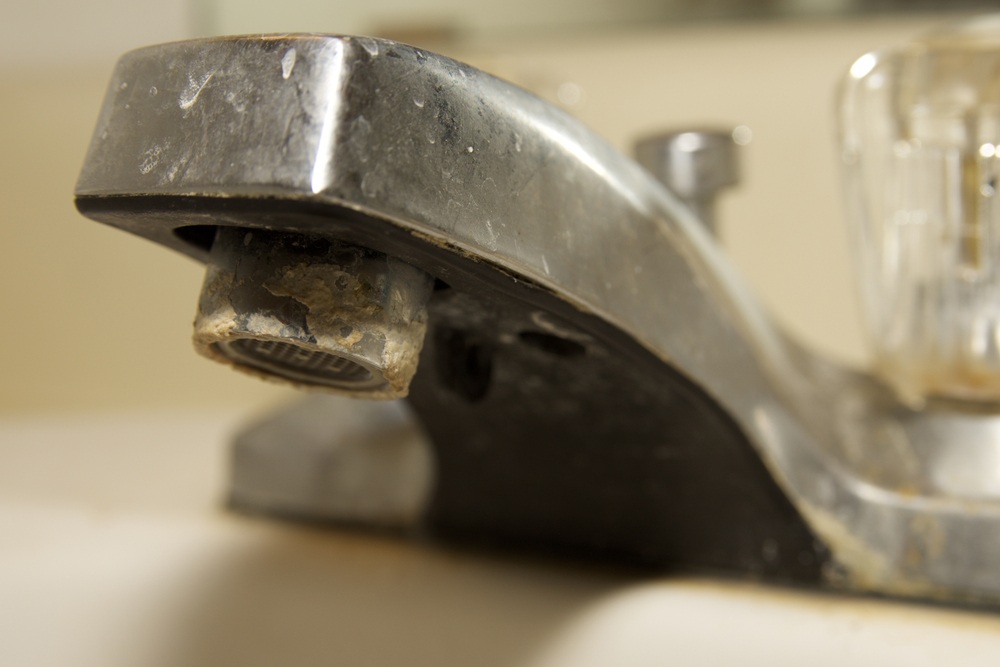The tap water in our homes often travels through lakes, rivers, limestone, soil, and plumbing to get there. Along the way, it can pick up sediments and minerals such as calcium, iron, and magnesium. While generally safe to consume, an abundance of such water contaminants can cause unfavorable side effects if they exceed 180 milligrams per liter. If you recognize any of the following issues with the water you drink, bathe in, and clean with, then you may need to install a water softener in your home.
1. Your Water Smells and Tastes Strange
Residential drinking water that emits a foul sulfuric odor (similar to rotten eggs) is considered hard water. The smell is likely due to contaminants like hydrogen sulfide gas or sulfates created by magnesium and other bacteria. Other signals of water conditioning problems can be identified by taste. Unpleasant hard water tastes include:
- Dirty taste – due to old pipes or a buildup of sediment
- Metallic taste – due to a buildup of iron
- Moldy taste – due to algal blooms or a buildup of algae
2. Your Water Won’t Drain
Shower water that pools around your feet and is otherwise slow to drain is a strong indicator of hard water. Overtime, calcium and magnesium deposits can buildup on the inside of your pipes. Such formations, called scale, reduce the diameter of your pipes and create blockages that restrict proper drainage.
3. Your Water Drips or Lacks Pressure
Dissolved compounds of calcium and magnesium can also cause your water flow to narrow and your water pressure to slow. If your time in the shower is limited due to a steady decrease in water pressure, then you may have hard water sediment clogging your in-flow water pipes.
4. Your Water Leaves Spots and Stains
Hard water minerals, like calcium and magnesium, just don’t mix well with soap and detergent—resulting in unsightly spots and stains. You may have hard water if your laundry, dishes, and shower frequently show the following symptoms:
- Soap scum – Crusty, white, calcium spots left behind from evaporated water on tubs and shower curtains can eventually develop mildew and bacteria if not treated.
- Reddish or brown stains – Rusty discoloration inside tubs or along the bottom of appliances such as dishwaters, coffee pots, icemakers, or hot water heaters can be the result of excessive traces of iron in your water.
- Dry spots – Stiff clothes and spotty dishes due to unrinsed detergent are always a sure sign of hard water.
5. You Don’t Feel Clean After Bathing
Since hard water doesn’t react properly with soap, you will have difficulty generating a decent lather with your soap and shampoo. As if that wasn’t frustrating enough, hard water can also prevent you from feeling fully rinsed at the end of your shower—leaving a soapy residue on your skin. After drying yourself of hard water, your hair will feel brittle and unmanageable and your skin dry and irritated.
Experienced Water Softener Installers
Stop settling for an unsatisfactory bathing experience. Feel clean and rejuvenated with Domer’s inventory of water treatment systems and water softeners. We have years of experience in treating hydrogen sulfide and other well water chemicals that can lead to hard water. For more information about our affordable water softener products and services, give us a call at 863-763-3417 today.
Domer's Inc.
204 SE 10th AvenueOkeechobee, FL 34974
Get Customized Directions Here
Tel: (863) 763-3417
Fax: (863) 763-7339
Email: [email protected]
Business Hours:
M-F 7:30am - 5:00pm
Closed Weekends
Emergency Service
Available 24/7
 Follow Us on Facebook
Follow Us on Facebook


